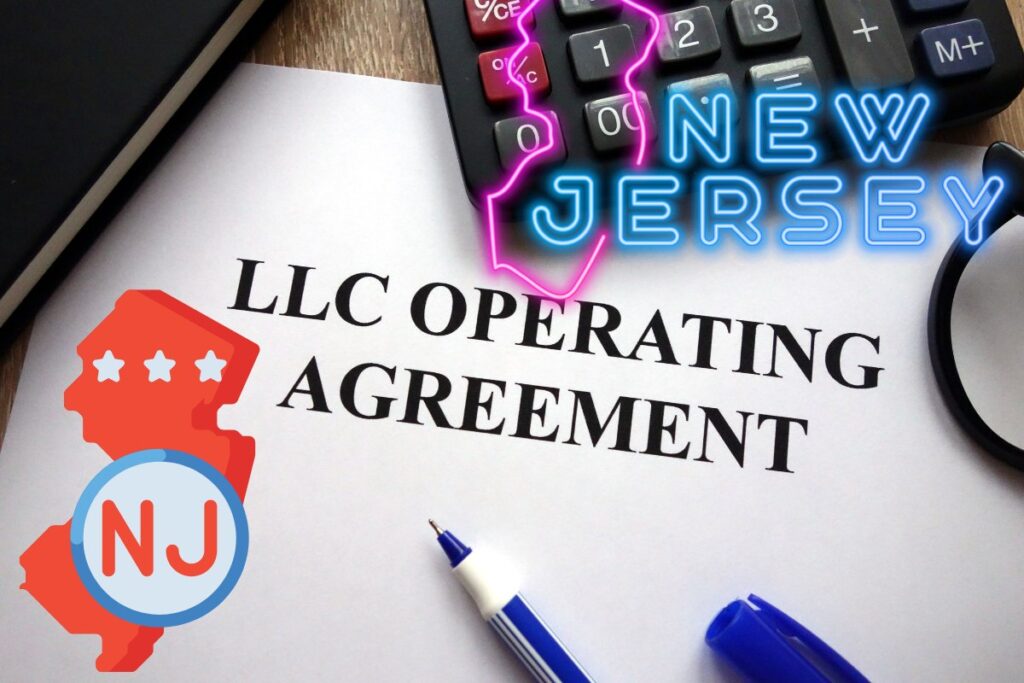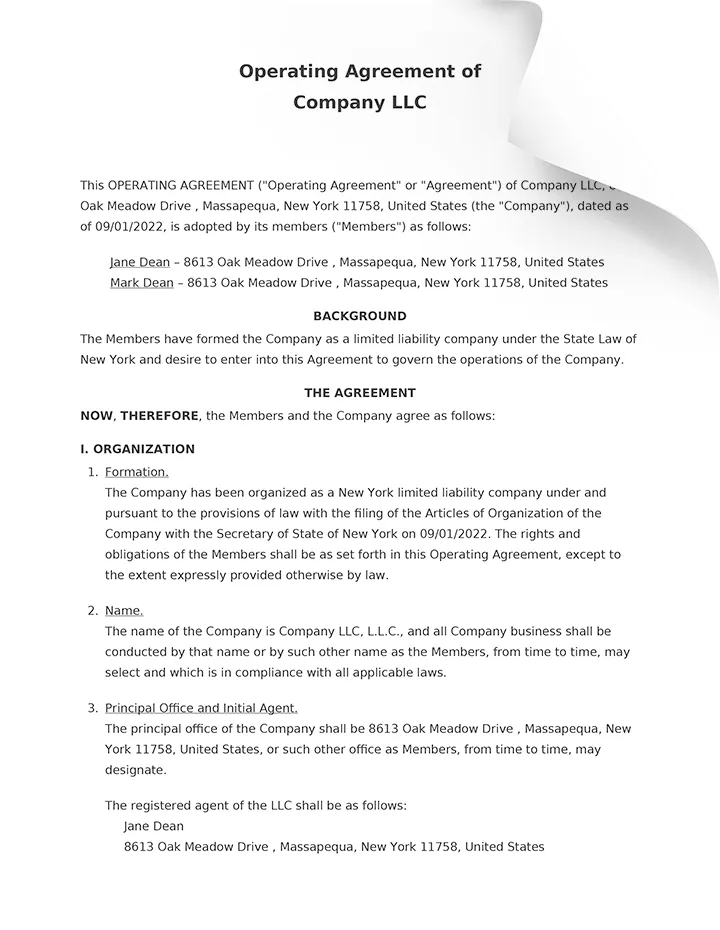Navigating the process of formalizing your business in Garden State begins with drafting a comprehensive New Jersey LLC Operating Agreement. This document outlines your limited liability company’s operational procedures, financial arrangements, and overall management structure. The New Jersey Department recognizes this agreement as a crucial step for limited liability companies. It ensures that all business entities within the state operate with clarity and consistency.
What is an Operating Agreement for an LLC in New Jersey?

A New Jersey LLC Operating Agreement is a crucial legal document that establishes the operational and financial framework of your business. It defines how the company will be managed, detailing key aspects such as profit and loss distribution, member roles and responsibilities, and decision-making processes.
While New Jersey law does not mandate an operating agreement for LLCs, having one is strongly recommended. It helps prevent disputes, ensures clarity among members, and provides a structured approach to business operations.
One essential provision of the agreement is the designation of a registered agent, responsible for receiving legal documents on behalf of the LLC. This role is vital for maintaining the company’s legal standing, ensuring compliance with state regulations, and responding promptly to legal matters. The operating agreement further clarifies the registered agent’s responsibilities, eliminating any uncertainty regarding their authority and duties.
Customizing your New Jersey LLC Operating Agreement to fit your specific needs creates a strong foundation for your business. By clearly outlining governance rules and operational procedures, it protects members’ rights, minimizes legal risks, and contributes to the company’s long-term success.
What Are the Benefits of New Jersey LLC Operating Agreements?
A New Jersey LLC Operating Agreement provides a structured and legally sound framework for managing an LLC, offering numerous advantages to its members.
Clear Ownership Structure and Legal Protection:
– LLC members use this agreement to define ownership structure, customize state default rules, and prevent disputes by clearly outlining responsibilities, including asset management and liability for company debts.
– One of the key benefits of an operating agreement is its ability to protect the company’s assets while providing legal clarity on governance. It serves as a critical reference for operational procedures, similar to how corporations structure their bylaws.
Financial and Governance Framework:
– Additionally, it specifies how profits are distributed among members based on their capital contributions and ownership percentages. By outlining financial and governance arrangements, it ensures transparency in business operations.
– A well-drafted New Jersey LLC Operating Agreement also strengthens long-term business stability by aligning with state legal standards and tailoring policies to fit the company’s specific needs.
Safeguarding Ownership and Minimizing Disputes:
– It provides a clear framework for asset management, capital account adjustments, and the appointment of a registered agent, reinforcing each member’s rights and obligations.
This customized approach safeguards ownership interests, fosters efficient management, and minimizes potential conflicts among members. While not legally required, an operating agreement is a best practice for ensuring a New Jersey LLC operates smoothly and remains legally compliant.
Key Considerations When Creating a New Jersey LLC Operating Agreement

The first step in forming an LLC in New Jersey is obtaining a Certificate of Formation from the state. This certificate officially recognizes the LLC, verifies the uniqueness of the business name, and confirms compliance with New Jersey’s legal requirements. Maintaining an updated certificate is essential, as any changes to the LLC’s structure or operations must be reflected to ensure ongoing compliance.
When drafting an LLC Operating Agreement, several factors must be considered:
1) Membership Structure
- A member can be an individual or a legal entity under New Jersey law.
- An LLC may have a single member or multiple members, depending on its ownership structure.
2) Agreement Format and Validity
An operating agreement can be established in various forms:
- Oral
- Written (physical or electronic records)
- Implied through conduct
- A combination of the above
3) Length and Scope
- Long-Form Operating Agreement:
- A comprehensive document covering governance, financial arrangements, decision-making, and dispute resolution.
- Reduces the risk of conflicting provisions and provides clear guidance for all aspects of the business.
- Short-Form Operating Agreement:
- Covers specific matters in a concise format.
- Can be used as a standalone agreement or combined with other documents to address different operational aspects.
Ensuring Compliance and Effectiveness
To be effective, an LLC Operating Agreement must align with New Jersey state laws and comprehensively address the needs of the business. Whether long-form or short-form, the agreement should provide clarity, minimize risks, and establish a solid foundation for the LLC’s success.
Membership Considerations for the LLC
Members of an LLC must act in accordance with the operating agreement and New Jersey state laws to ensure smooth operations and legal compliance. A well-drafted agreement clearly defines each member’s rights, responsibilities, and obligations, including provisions for adding or removing members to maintain business continuity.
Membership Structure & Admission –
- Members may be individuals or legal entities.
- The operating agreement should specify how new members are admitted, whether:
- As outlined in the agreement itself
- Through mergers, conversions, or domestication
- By unanimous consent of existing members
Each member typically provides contact details, which are attached to the agreement for record-keeping.
Membership Interests & Capital Contributions –
- Membership interests are often based on initial capital contributions, which determine ownership percentages.
- Ownership can be structured as equal (50/50) or proportional based on contributions.
- While a capital contribution may not be required, it helps define ownership stakes and voting power.
- New members automatically agree to the operating agreement’s terms but should formally sign it to acknowledge their rights and contributions.
Transferable Interests & Voting Rights –
- A transferable interest refers to a member’s right to receive distributions, even if they leave the LLC.
- Voting rights depend on the operating agreement:
- Business decisions typically require a majority vote.
- Major actions, like selling LLC assets, may need supermajority or unanimous approval.
- In member-managed LLCs, unless otherwise stated, each member has one vote, with a simple majority deciding regular business matters.
Liability & Key Employees –
- Members and managers are not personally liable for the LLC’s debts unless stated otherwise in the operating agreement.
- If members are key employees, additional provisions like employment agreements and non-compete clauses may be necessary.
- If certain provisions are missing, the LLC should define the default rules it follows.
Management Provisions for the New Jersey LLC
The management provisions in a New Jersey LLC Operating Agreement establish the decision-making framework and leadership structure of the company. LLCs can be either member-managed or manager-managed, with the default being member management unless stated otherwise in the operating agreement.
Additionally, the agreement may outline officer roles, their appointment and removal process, and their specific powers. The LLC can also authorize individuals to handle transactions, execute property transfers, and enter into agreements through a statement of authority filed with the Department of Revenue and Enterprise Services (DORES).
If there is a conflict between the statement of authority and the operating agreement, the operating agreement prevails concerning members, transferees, managers, and dissociated members.
Furthermore, the agreement should address contracts or transactions involving interested parties, clarifying roles, responsibilities, and authority within the LLC.
– Member-Managed LLCs –
In a member-managed LLC, all members share management duties unless otherwise specified. The agreement should clarify:
- Whether all members, specific members, or a class of members will manage the LLC.
- If all members have authority to bind the LLC or if limitations exist.
- Whether certain members have veto powers or other special decision-making rights.
Typically, each member has one equal vote, regardless of ownership percentage or capital contribution.
- Routine decisions require a simple majority vote.
- Major actions outside normal operations need unanimous consent.
- Members aren’t entitled to compensation for management duties unless explicitly stated.
– Manager-Managed LLCs –
In a manager-managed LLC, members delegate management to one or more managers, who may be individuals or entities. The agreement should specify:
- The process for appointing managers, usually by majority vote unless stated otherwise.
- Whether managers must be members (they typically do not have to be).
- If a member-manager dissociates, they automatically lose managerial status but may remain a member.
The agreement also determines managerial tenure:
- Managers may serve for a fixed term, indefinitely, or until replaced.
- If no provision exists, managers continue until they resign, are removed, or otherwise disqualified.
Financial Provisions in a New Jersey LLC Operating Agreement
The financial provisions of an LLC Operating Agreement outline how capital contributions, profit allocations, and distributions are managed. These provisions ensure clarity in financial responsibilities and help prevent disputes by establishing clear guidelines for contributions, ownership stakes, and the distribution of profits and losses.
Capital Contributions —
Members are not required to make capital contributions unless the operating agreement states otherwise. However, if contributions are made, the agreement should specify:
- The form and amount of each member’s contribution.
- Whether contributions consist of cash, property, services, promissory notes, or other agreements to provide assets.
For non-cash contributions, the agreement should clearly document terms and valuation to prevent disputes and ensure transparency.
Allocations and Distributions —
The LLC operating agreement may specify how the profits and losses will be allocated. If not, they may be allocated equally among current and dissociated members. Net profits and losses may also be allocated according to each member’s percentage ownership or a more complicated waterfall provision.
*A waterfall provision establishes that tiers will receive priority for distributions of cash and property out of the LLC or for allocations of LLC income. Typically, each tier of the waterfall provision is entitled to an allocation that it receives in full before the next tier gets any proceeds or allocation.*
Taxation Considerations for an LLC

By default, an LLC is treated as a pass-through entity, meaning it is not subject to entity-level taxation like corporations. Instead, profits and losses are passed directly to the owners and reported on their personal tax returns.
- A single-member LLC is treated as a sole proprietorship for tax purposes.
- A multi-member LLC is classified as a partnership unless it elects otherwise.
The operating agreement should clearly define the LLC’s tax classification and obligations to ensure compliance with federal and state tax laws. Additionally, it should specify the LLC’s fiscal year, which typically follows the calendar year to simplify tax reporting and financial planning.
New Jersey State Tax Treatment:
- A single-member LLC is treated as a disregarded entity for New Jersey state tax purposes unless it elects a different federal tax classification.
- A multi-member LLC is taxed as a partnership at the state level unless it opts for corporate taxation.
Reporting and Compliance:
The operating agreement should also outline financial reporting requirements, including any necessary IRS filings, to ensure the LLC remains compliant with tax regulations and meets all federal and state tax obligations efficiently.
Dissolution and Winding Up of an LLC

An LLC exists perpetually unless the operating agreement specifies conditions for dissolution. The agreement may outline events or circumstances that trigger dissolution.
Dissolution involves:
- Member approval (unanimous, majority, or supermajority, per the agreement).
- Filing the final tax return and articles of dissolution.
- Settling debts and distributing remaining assets.
The agreement may also define procedures to revoke dissolution, extend the LLC’s duration, or modify dissolution-triggering events.
New Jersey LLC Operating Agreement Generator
A free LLC Operating Agreement generator is a valuable tool for those looking to create a New Jersey LLC Operating Agreement efficiently and in compliance with state laws.
This tool streamlines the process, ensuring all essential provisions are covered while aligning with New Jersey legal requirements.
It allows users to generate a customized LLC Operating Agreement or template, designed with legal guidance, to help draft a well-structured agreement tailored to their business needs.
Create A New Jersey LLC Operating Agreement Now
New Jersey LLC Operating Agreement FAQs
-
Can a New Jersey LLC Operating Agreement be amended?
Yes, an LLC Operating Agreement can be amended at any time, but the process must be outlined in the agreement itself. Most agreements require a majority or unanimous vote from members to approve changes. It’s recommended to document all amendments in writing and keep them with the original agreement.
-
Does an LLC Operating Agreement need to be notarized in New Jersey?
No, New Jersey does not require an LLC Operating Agreement to be notarized for it to be legally valid. However, notarizing the document can add an extra layer of authenticity and help prevent disputes over its legitimacy.
-
How can an LLC protect personal assets in New Jersey?
An LLC helps protect personal assets by creating a legal separation between the business and its owners. However, to maintain this protection, members must follow best practices such as keeping personal and business finances separate, adhering to the operating agreement, and avoiding fraudulent activities.
-
Can an LLC in New Jersey have a foreign or out-of-state member?
Yes, New Jersey allows LLCs to have members who reside in other states or countries. However, these members may have different tax obligations based on their residency and the LLC’s income distribution.
-
What happens if an LLC member passes away?
If a member dies, the LLC Operating Agreement should specify what happens to their ownership interest. The agreement may allow for a transfer to heirs, a buyout by remaining members, or another predetermined succession plan. If no provision exists, state default laws may govern the transition.
-
Can a New Jersey LLC Operate under a different business name?
Yes, an LLC can operate under a DBA (Doing Business As) name, also known as a trade name. This allows the business to use a different name than its registered LLC name. The DBA must be registered with the appropriate New Jersey agencies.
-
What are the annual reporting requirements for a New Jersey LLC?
New Jersey LLCs must file an Annual Report with the Division of Revenue and Enterprise Services. This report confirms key business details and must be filed each year to keep the LLC in good standing.
-
Can a New Jersey LLC be converted into a corporation?
Yes, a New Jersey LLC can be converted into a corporation through a process called statutory conversion. This requires filing a Certificate of Conversion and meeting state-specific requirements. Many businesses convert for tax advantages or investment purposes.





